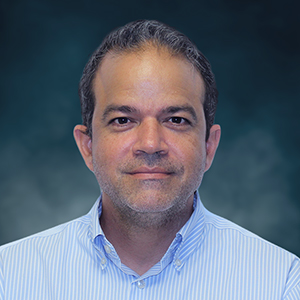Dr. Abel Baerga Ortiz
Contact Info
Education
- Post Doctoral Fellowship in Biochemistry, 2005 University of Cambridge
- h.D. University of California – San Diego, 2001
- MS University of California – San Diego, 1998
- BA Bachillerato en Ciencias (Química), 1996
Biography
Research Interests
Bacterial production of fatty acids. Large-scale microbial cultures represent an important vehicle for the production of fatty acids and alcohols, both of which can be further processed to make biofuels. A typical strategy for enhancing the production of fatty acids consists of re-engineering the bacterial metabolic pathways by introducing or deleting specific genes. Our group has reported that introducing certain genes from deep-sea bacteria can enhance fatty acid production in E. coli. We are currently working to elucidate how this enhancement in fatty acid production is mediated and whether it can be extended to organisms that aere currently used for commercial production of these valuable compounds.
Pro-inflammatory bacterial genes and colorectal cancer. Many research efforts are focused on elucidating the role of the gut microbiota in the promotion of intestinal diseases such as colorectal cancer. Our group has centered in developing methods for the quick and inexpensive detection of specific bacterial genes in stool samples. As part of this effort, we have found in human stool, a number of bacterial genes that have been previously associated with inflammation in other tissues such as kidney and skin. The presence of these pro-inflammatory genes in the human gut and their increased frequency in colorectal cancer patients, suggest a possible link between harboring these genes and the risk of cancer. We are currently exploring possible mechanisms by which these genes may promote inflammation in the GI tract.
The glycan distribution of viral glycoprotein-based vaccines. The Env glycoprotein from the Human Immunodeficiency Virus (HIV) is the template for a number of vaccine candidates currently under development. It contains 27 glycosylation sites and more than half of its molecular weight is attributable to sugars. Our laboratory is developing MALDI-ToF/ToF methods for the measurement of the glycan composition of HIV Env and its clinically relevant versions.
Selected Publications:
- González-Feliciano JA, Akamine P, Capó-Vélez CM, Delgado-Vélez M, Dussupt V, Krebs SJ, Wojna V, Polonis VR, Baerga-Ortiz A, Lasalde-Dominicci JA. A recombinant gp145 Env glycoprotein from HIV-1 expressed in two different cell lines: Effects on glycosylation and antigenicity.PLoS One. 2020 Jun 19;15(6):e0231679. doi: 10.1371/journal.pone.0231679. PMID: 32559193
- Rullán-Lind C, Ortiz-Rosario M, García-González A, Stojanoff V, Chorna NE, Pietri RB, Baerga-Ortiz A. Artificial covalent linkage of bacterial acyl carrier proteins for fatty acid production. Sci Rep. 2019 Nov 5;9(1):16011. doi: 10.1038/s41598-019-52344-w. PMID: 31690733
- Gómez-Moreno R, Martínez-Ramírez R, Roche-Lima A, Carrasquillo-Carrión K, Pérez-Santiago J, Baerga-Ortiz A. Hotspots of Sequence Variability in Gut Microbial Genes Encoding Pro-Inflammatory Factors Revealed by Oligotyping. Front Genet. 2019 Jul 9;10:631. doi: 10.3389/fgene.2019.00631. PMID: 31354787
- Gómez-Moreno R, González-Pons M, Soto-Salgado M, Cruz-Correa M, Baerga-Ortiz A. The Presence of Gut Microbial Genes Encoding Bacterial Genotoxins or Pro-Inflammatory Factors in Stool Samples from Individuals with Colorectal Neoplasia. 2019 Feb 1;7(1):16. doi: 10.3390/diseases7010016. PMID: 30717148

